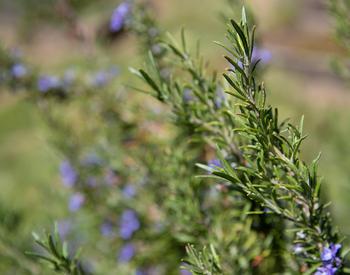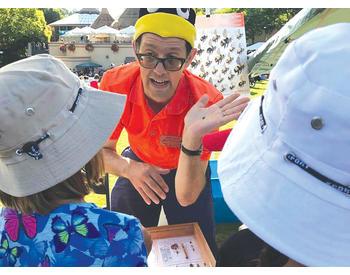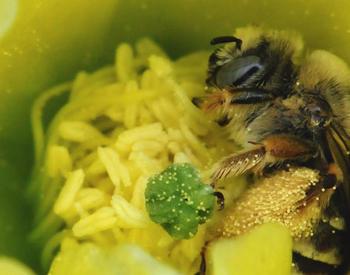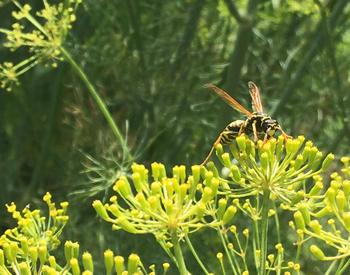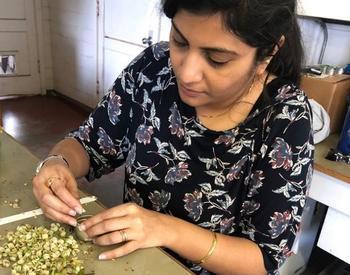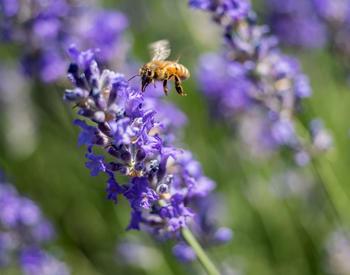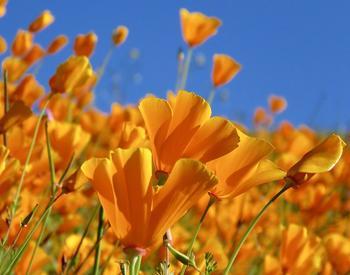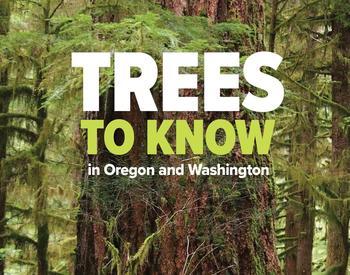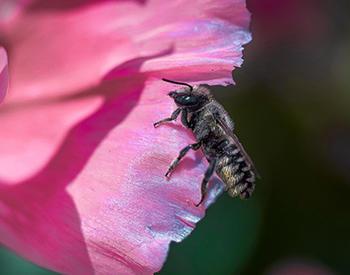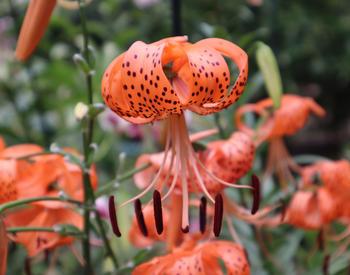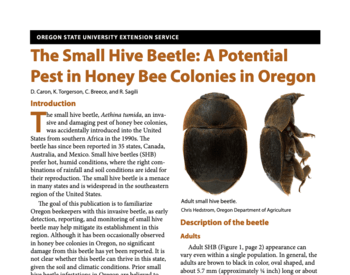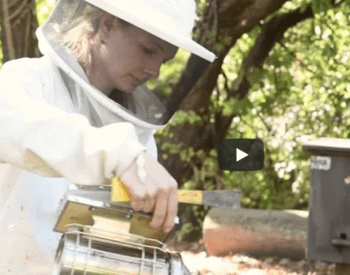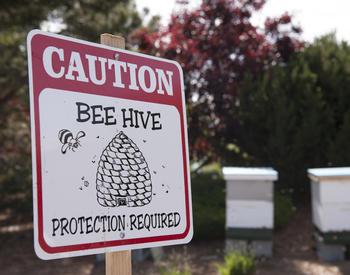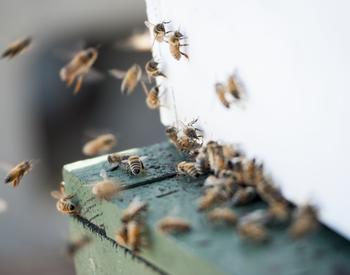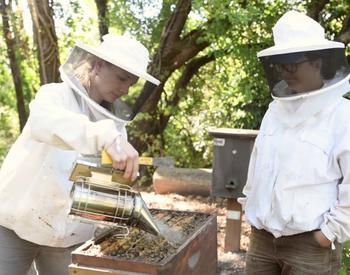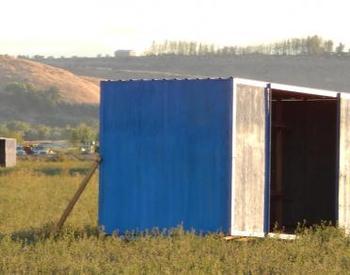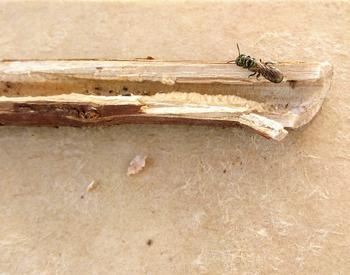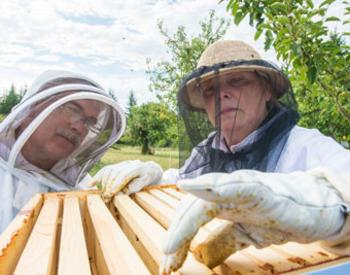Transcript
Speaker 1: From the Oregon State University Extension Service, this is Pollination, a podcast that tells the stories of researchers, land managers, and concerned citizens making bold strides to improve the health of pollinators. I'm your host, Dr. Adoni Melopoulos, assistant professor in pollinator health in the department of horticulture. On National Pollinator Week, I had the good fortune of talking with Kim Flottom on the Bee Culture podcast. And in that podcast, I said, you know, one of the real shocking differences between native bees and honeybees is not biological, but social. If you're a beekeeper, there's a bee club you can join. As an amateur, you can join something, you can be part of a community, you can get together. With native bees, often the case is that there isn't.
You are either a professional or a scientist or there's really nothing for you to join. Well, this is no longer the case, particularly in the province of British Columbia. The Native Bee Society of British Columbia was formed last year. And today we're going to be talking to its founding president, Sarah Johnson. You may remember Sarah. She was on the show a couple of years ago doing Bumble Bee reintroductions in the province of Ontario with Wildlife Preservation Canada. She's now come out west where she is doing her PhD at Simon Fraser University, studying how bumblebees are impacted by changing landscapes. In British Columbia, she holds the prestigious Vanie Canada graduate scholarship. And we hope to have her back on the show to talk about her research. But today she's going to give us a snapshot of this new Native Bee Society of British Columbia and its activities and how one can get involved.
Hope you enjoy the show. OK, well, we're here to talk about the Native Bee Society of British Columbia. And I'm really glad to have you back. You were one of our early guests early on when you were over on the other side of the country, you were over in Ontario.
Now you've come to the West Coast, which is fantastic. I wanted to know where the idea for a Native Bee Society in British Columbia came from and who are the people that make up the membership of this society.
Speaker 2: Yeah, so I was really excited to move back to BC because I'm originally from BC. But funnily enough, our origin story is actually pretty tightly tied in with the Oregon Bee Project and the Oregon Bee Atlas. A small group of us, who are now part of the board of the Native Bee Society of BC, went to the first annual Pacific Northwest pollinator summit in Corvallis last year. And we were all seated together at the Canada table, which was comparably a pretty large region to some of the parts of Oregon that got their own table. However, we were discussing some of the gaps for pollinator work in BC because most of us were working in BC. And brainstorming ways that we could fill some of those gaps. And all of us were super envious of the extension program in the US.
And we felt that specifically, that's like a pretty big hole for effective conservation in Canada, where practitioners and regular folks don't really seem to be communicating as much with the government or scientists in universities. And so that's where the idea for formalizing our society was born. All of us feel really strongly about collaboration and using everybody's diverse strengths and interests. So we accept just about every type of person imaginable as a member. So currently we have members that are artists, scientists, educators, authors, beekeepers, farmers, and yeah, pretty much anyone with a passion for preserving pollinators in the province is welcome.
Speaker 1: I remember you had your first annual meeting was in November. November. And it was a smashing success. And wasn't it at some, where was the location again? It was somewhere interesting.
Speaker 2: Yeah, it was the red barn in Taranova Park in Richmond in the lower mainland in BC. And we were so shocked at how well it went. We had, I think close to 100 people show up and we barely advertised. There were so many different types of people and they were also excited about bees in the province. So that was really great start for our momentum.
Speaker 1: The thing I find really exciting about the people I know in the society is that it is a very, the way you described it, it's a very diverse group. You've got, you do actually have artists and you do have people who are doing conservation and you do have gardeners and you do have beekeepers. It is a very grassroots kind of organization.
Speaker 2: Yeah, it's really, really awesome. And super exciting for me as just a boring old biologist to work with all of these super creative people. It's really, really interesting.
Speaker 1: Well, I know lots of us in Oregon are excited about BC. We're connected through the region. We share mountain ranges and a lot of the fauna is the same. But tell us a little bit about the BC bee fauna. Why it's so important to be by diversity in the region? And what are some of the key problems that you face for conservation up there in British Columbia?
Speaker 2: Yeah, so BC is really awesome and BC is a really special province in Canada specifically. We have over 500 species of bees at minimum, which is by far the most diverse province in Canada for bees.
This is mostly because we have a huge diversity of ecosystem types in the province as well. There are 13 different biogeochlamatic zones which come with a wide diversity of specialized plant communities as well, which means a diversity of bee species. But interestingly enough, the vast majority of bee species actually come from this other and interior region of the province.
So it turns out bees really like deserts, which Olivia touched on in her recent webinar, which was really cool. But yeah, so BC has this crazy diversity, but the West in general also like there's not as much known about biodiversity here. There hasn't been as much taxonomic focus until really recently. So there are a lot of new species potentially to still find, describe, and put names on in BC. And not a ton of research effort has been focused in the province.
So there's only really been one extensive survey throughout the whole province in recent decades, and most of the northern portion of the province is very, very severely undersampled. So yeah, it's a great opportunity for us. And so one of the key problems currently in the province is that there's a lot of this kind of disparate people and organizations like grassroots similar to us that are interested in supporting pollinator-friendly activities. But there wasn't this central hub of connection between all of those people. So that is where we will hopefully come in.
Speaker 1: That's fantastic. And it is true. It's like, you know, it's a it's a long deep province. You can go from oak, the oak habitat in Vancouver Island up to the boreal forest. Like you've got a real range that range that we don't have here in Oregon. You really.
Speaker 2: Yeah, it's cool. If you go far enough north, there are Arctic species of bees up there in the province. So yeah, I think potentially some of the further northern species of bumblebees likely extend into northern BC. But there are so few roads and like access is so difficult that nobody knows a lot about the fauna up there.
Speaker 1: But what your work is up relatively north, you're kind of in the belly button middle.
Speaker 2: Yeah, I'm in the middle, which like as Canadians, we always call the middle of all the provinces north, but yes.
Speaker 1: Now, I imagine COVID has put a damper on the activities of the society. You just got off the ground and then COVID happened. What activities do you offer now and what are the plans, you know, after COVID subsides? How was the society's kind of long-range mission here?
Speaker 2: Yeah, you're totally right. It was super devastating for us. We had so many events planned and like so many crazy awesome activities throughout the province that we have put a lot of work into preparing for and then all of them got canceled. So currently we're kind of rejigging all of our efforts into developing a lot more online content and converting some of our planned events into webinars. So we're actually holding a beginner macro photography workshop, which is online on July 22nd, that is $5 to register or free for members which should be really awesome. Sean McCann is our guest speaker for that. And he's a really, really amazing amateur macro photographer.
Speaker 1: And this week, that's going to be. Yeah. OK, so people can register. We'll have in the show notes, we'll have the link on how to register. Everybody should do this. I'm going to do it because I'm a terrible macro photographer. OK, sorry.
Speaker 2: Yes, and it's open for beginners. So I am I will also be speaking for a smaller portion of the workshop. And I'll be talking about kind of tricks that I've used to bypass some of the harder aspects of photography. Like I barely ever changed my camera settings. So hopefully I can help people who are a little bit gun-shy about using the trickier cameras, which with some secret tricks and tips. Fantastic.
Speaker 1: OK, well, that's great. But you did member you did mention membership. And I imagine we have I know we have a sizable listenership in BC. How does a BC listener get involved with the society?
Speaker 2: Yeah, so pretty much the main way that you can get involved is to join the society. As I said, we welcome anybody and everybody and it's only twenty-five dollars for the year for membership, and the membership year ends in February. But with that twenty-five dollars, you get access to either free or heavily discounted events. So any sort of events that the society runs, we either offer for free for members or with a substantial discount. And in the future, we plan to be developing a lot more membership-exclusive content. So it's really, really easy to register as a member. You just go to our website, BC native bees dot org, and there's a membership tab and you just fill out the form, and you register.
Speaker 1: OK, well, let's say these all really sound like exciting activities. We're all joined at the hip in the Pacific Northwest. Let's say people outside the province wanted to support the society. How do we do that?
Speaker 2: I have people outside the province who are welcome to join as members. We actually have quite a few members who don't live in British Columbia and are just interested in supporting our work. Our work will obviously focus on bees in BC. But like as you can see with the macro photography workshop, a lot of the content that we offer isn't necessarily specific to just BC. And a lot of the same bee species live in the rest of the Pacific Northwest. So I think it would still be valuable for people outside of BC to become members.
Speaker 1: Well, I am so excited that you guys have gotten this off the ground. This is really wonderful. I can just see and I also just it's such a heartening. It's so heartening to see an initiative like this really get off the ground so spontaneously with such a diverse group of people. Congratulations on founding the society. And we're really looking forward to hearing more about your activities.
Speaker 2: Thank you so much. We are so excited to get to work.
Speaker 1: Thank you so much for listening. The show is produced by Quinn Sinan Neil, who's a student here at OSU in the New Media Communications Program. The show wouldn't even be possible without the support of the Oregon Legislature, the Foundation for Food and Agricultural Research, and Western SARE. Show notes with links mentioned on each episode are available on the website, which is at pollinationpodcast.oregonstate.edu
I also love hearing from you and there are several ways to connect with me. The first one is you can visit the website and leave an episode-specific comment. You can suggest a future guest or topic or ask a question that could be featured in a future episode. But you can do the same things on Twitter, Instagram, or Facebook by visiting the Oregon Bee Project. Thanks so much for listening and see you next week.
There are a growing number of people interested in native bees, but not many regional organizations you can belong to. Today we hear about an example of building such organizations in the Canadian province of British Columbia.
Sarah Johnson is the founding President of the Native Bee Society of BC established July 2019. Sarah is also a pollination ecologist with an endless passion for the conservation of our furry friends, the bumble bees! She is a PhD candidate at Simon Fraser University studying how bumble bees are impacted by changing landscapes in British Columbia. She currently holds a Vanier Canada Graduate Scholarship, one of the top PhD awards in Canada. Sarah was on a previous episode talking about her role in managing a national native pollinator conservation program based out of southern Ontario with citizen science.
